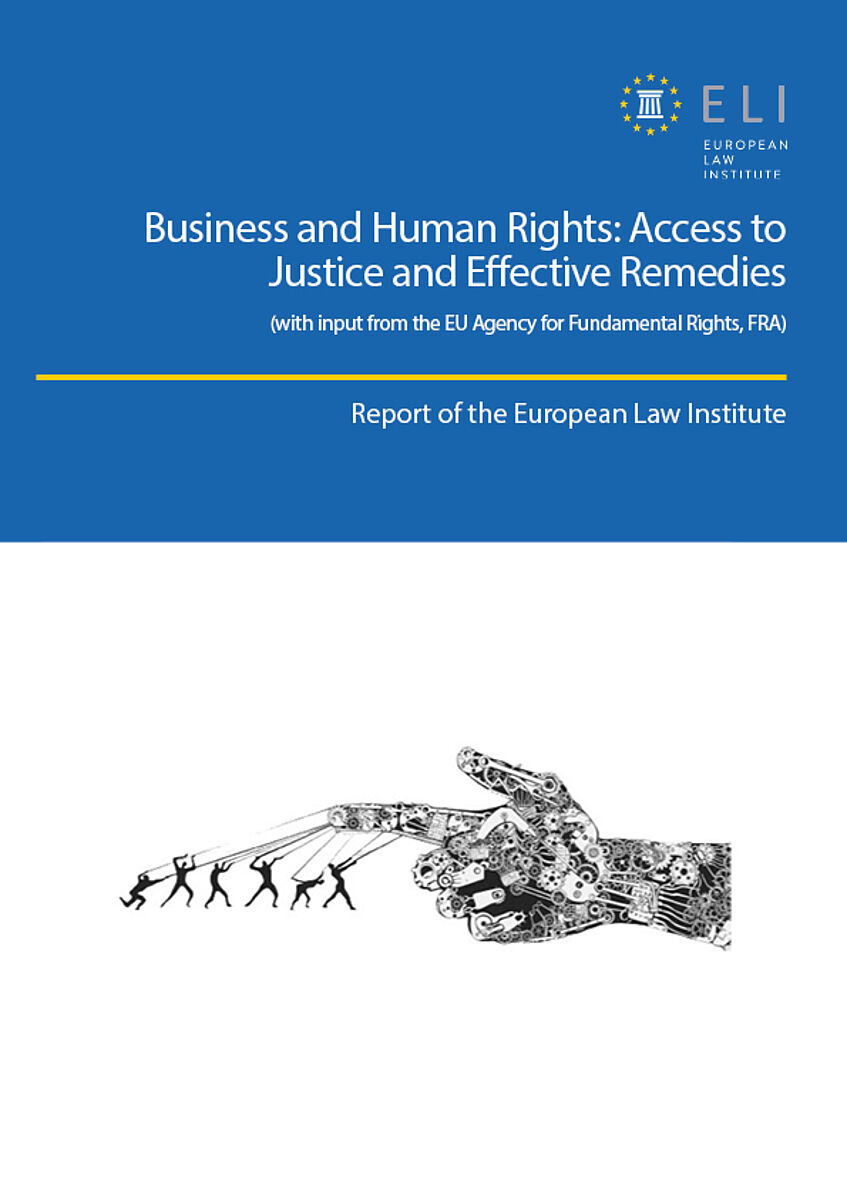ELI-FRA Report on Business and Human Rights: Access to Justice and Effective Remedies
Quick Facts
Project Type: Regulatory/Soft Law Options and Recommendations
Procedure: Accelerated
Adopted: CD 2018/2 (On Projects)
Project Period: February 2018–December 2021
Events
An overview of past and upcoming events of this project is available here.
Publications
Further publications about the project are available here.
Summary
This ELI project, conducted with input from FRA, aimed at identifying a range of possible regulatory and/or soft-law options, at Member State level, at EU level and for non-Member States, intended to increase access to remedies in the EU and Member and non-Member States and to ensure compliance with human rights by business enterprises.
Background
Multinational corporations can exercise economic and social influence that sometimes rivals that of nation States, being capable of having a positive or a negative impact on human rights, and, in a European Union (EU) or constitutional context, on fundamental rights. EU citizens, consumers and corporate entities expect that businesses which are active and compete within the EU internal market respect human rights standards when it comes to their global activities – irrespective as to whether or not they are multinational companies. Where their impact amounts to an abuse of human rights, effective remedies should be made available to the victims to avoid rendering human rights nugatory. Whereas access to remedy constitutes a human right and one of the three pillars of the polycentric governance system articulated by the UN Guiding Principles on Business and Human Rights (UNGPs), it is, in fact, often hindered by a number of factors, partly inherent in the imbalance of power between victims of human rights abuse and large companies.
Aim
This ELI project, conducted with input from FRA, aimed at identifying a range of possible regulatory and/or soft-law options, at Member State level, at EU level and for non-Member States, intended to increase access to remedies in the EU and Member and non-Member States and to ensure compliance with human rights by business enterprises. In this context, human rights include rights in the broader sense of proper employment practices and care for the environment.
Outcome
The Report focuses on a set of ideas central to the Report’s aim and key to reducing the persisting barriers that hinder access to justice and effective remedies for business-related human rights violations. These include appropriate legal procedural rules, the availability of judicial collective redress procedures and of effective non-judicial mechanisms, access to information, private international law jurisdictional rules and applicable law regimes, as well as the link between human rights due diligence and remedies.
Case Studies
For some illustrative examples that the Business and Human Rights project seeks to tackle, please click here.
Project Reporters
- Jonas Grimheden
- Diana Wallis
Further Project Team Members
- Daniel Augenstein
- Robert Bray
- Duncan Fairgrieve
- Filip Gregor
- Antonio Gutierrez-Cardenete (until September 2020)
- Laura Guercio
- Chiara Macchi
- Christopher Patz
- Patrycja Pogodzinska
- Ilaria Pretelli
- Lise Smit
Advisory Committee Members
- Karin Buhmann
- Cristiana Carletti
- Sandra Cossart
- Alix Frank-Thomasser
- Anežka Janoušková
- Remo Klinger
- Jacquelyn MacLennan
- Corrado Malberti (Assessor)
- Conor McCarthy
- Robert Pelikán
- Gabriela Quijano
- Lucas Roorda
- Elisabetta Silvestri
- Lord John Thomas (Assessor)
- John Vervaele (Assessor; until November 2021)
Members Consultative Committee
- Anne van Aaken
- Antigoni Alexandropoulou
- Marco de Benito
- Bitri & Bakiu Attorneys at Law (represented by Rezarta Bitri)
- Claire Bright
- Konrad Brodaczewski
- Vito Bumbaca
- Moustapha Ebaid
- Klaas Hendrik Eller
- John Gaffney
- Sarah Houllier
- Thalia Kruger
- Stephanie Laulhe Shaelou
- Vijay Kumar Singh
- Jonathan McGowan
- Manuel Peláez Muras
- Justyna Sarkowicz
- Birgit Spiesshofer
- Louise Ellen Teitz
- Emanuela Vitello

